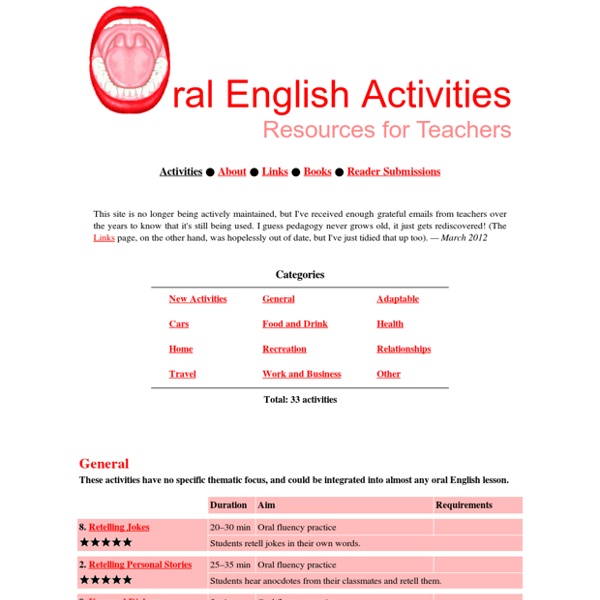No, It’s Not Arbitrary and Does Make Sense: Teaching the English Punctuation System
You might also try putting a period at the end of a “thought.” And what about semi-colons and colons? Well…maybe those are for exceptionally long breaths and thoughts?
We’re on a roll! (Everyday idioms in newspapers)
by Kate Woodford We like to keep you supplied with frequent, up-to-date idioms on this blog. One way in which we do this is by reading, every few months, a range of national newspapers that were published on the same day. We then pick out the idioms and phrases in use. As ever, we only include common, current idioms and phrases – in other words, the type that will be most useful to learn. This week’s phrases come from tabloid newspapers.
Getting Them Speaking – Activities for the conversation class
In this workshop, my aim was to demonstrate a series of activities which can be used in class as a way of encouraging our students, particularly teenagers, to develop their speaking skills. NUMBERS BIOGRAPHY (Full lesson plan) I use this activity at the beginning of the year, when I want to get to know something about my students, and when they want to get to know me a little. At the start of the class I write five numbers on the board, and explain to the students that each number is linked to something significant in my life.
Giving Directions in English
Giving directions in English is one of the most useful functions there is. Everyone understands that this is the function they are likely to use on the street, literally, and therefore the motivation is usually quite easy. To be able to give directions you need to learn a set of phrases which you later combine into a conversation. To teach the phrases we offer you the following. A simple drill (teaching the basic phrases), an infographic, several worksheet activities and an interactive quiz.
Brilliant toilet!
In this activity, students hear about a strange restaurant recommendation. They watch a video in which Paul talks about a friend’s suggestion to visit a new restaurant in town specifically because of its brilliant toilet. But what could be so special about a toilet? And why is Paul offended by the recommendation? Language level: Intermediate + (B1)Learner type: Teens; AdultsTime: 45 minutesActivity: Reading and speakingTopic: RestaurantsLanguage: Evaluative adjectives (brilliant, wonderful, unbelievable, great, etc.)Materials: Video; worksheet Brilliant toilet (10156 downloads)
quizzes
The Science of Awkwardness Vsauce Vocabulary in contextPeople & society18 items Academic Word List (sublist 1) Preparing for IELTS? Studying academic vocabulary? This quiz will help you explore the words from the AWL and their collocations.
Topics for Debate in English
This page lists suggested subjects that can be discussed to practise agreeing and disagreeing in English. Here are 20 topics to discuss with a friend or group. Practise agreeing and disagreeing even if you have to argue against something you actually believe in. One way to have fun with this is to make up a bunch of cards that say agree or disagree. Each person has to pick up a card and then the topic is read out.
Things 2 do b4 u die
This activity deals with bucket lists – wishlists of things to do before you die (or ‘kick the bucket’). For example: participate in a demonstration; appear on the front cover of a newspaper; be an extra in a film; do a runner from a restaurant; get arrested; photocopy your bottom at work. Language level: Intermediate (B1) +Learner type: Mature teens; AdultsTime: 90 minutesActivity: Grammar drill; SpeakingTopic: Life & deathLanguage: ‘Have you ever …?’ questions; Past simple questions; Pronunciation of regular past participlesMaterials: Materials freeThings 2 do b4 u die [downloaded 6286 times]
Word list, List of words - www.myvocabulary.com
Q: How can I use 775 word lists from A: Suggestions for usage for teachers, parents, students and life-long learners! Choose 15-25 words that are unknown to you from the list provided. Look up and write down the definition, part of speech and use the new word in a sentence of more than 6 words. Practice using the new word.



